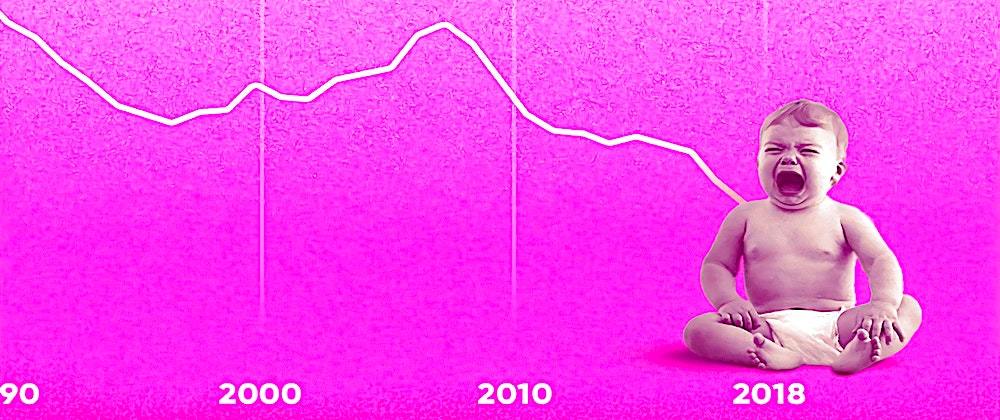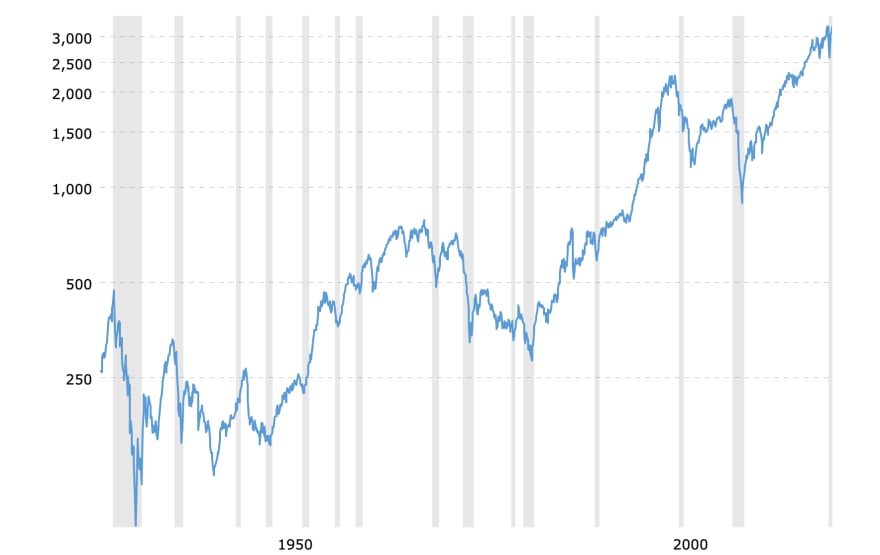Nowadays, many well-earning developers wonder whether or not investing in stocks is worth all the hassle.
Unfortunately, at the same time, most software developers still don’t know much about finance and investment in general, and the stock market specifically.
Even the developers, who joined early-stage start-ups or big tech companies and got proper compensation in stocks, don’t know how it will benefit them in the future.
When I started being interested in investment opportunities, I was terrified and intimated. I thought that this is only for financial experts and already wealthy people.
I was so wrong!
Of course, you should educate yourself first before you dive too deep into investing, but in reality, it’s not that hard as you think it is.
Especially if you begin with investing in the stock market.
💰 Stocks increasing your capital
Investing in stock is not gambling.
If you can save regularly and invest wisely over a long time, you can grow your capital enormously.
However, you shouldn’t invest if you are financially broke. Make sure before that your financial situation is in great shape, that you have an emergency fund to cover around three months of expenses in case of any emergency.
It can also be useful to learn how to free extra monthly cash from your dev-salary for investment, so you can spend less and invest more. For that, you can use my top-15 tips cheat sheet to save more cash monthly here.
Investing is very interesting, despite the capital growth, that gives you something intelligent to learn rather than playing video games or watching TV shows.
Most investors find long-term investments always beneficial for their capital.
For example, investing in high-growth new-on-the-market stocks may seem and certainly can be a great way to build wealth. Despite that, it’s wise to make an investment portfolio with the shares of established and grown companies.
“It is not necessary to do extraordinary things to get extraordinary results.”—Warren Buffett
The most convenient and unmistakable approach to growth capital in the stock market is to buy company shares with great businesses for reasonable prices; hold them as long as they remain doing great businesses.
Another impressive thing about stock investment, that your investment assets are liquid. You can sell them anytime and get your money back to your bank account.
📈 Stocks growing historically
It’s not a secret that there are bad and good times for stock investment.
This year, there was a stock market crash and have been market crashes, pullbacks, and periods of lousy performance before, and they will be in the market later in the future.
And still, the US S&P 500 has historically produced 10%-11% before inflation or 7%-8% after inflation, and you can easily access it through your online broker or bank account.
Overall, stocks tend to rise over the last 80-100 years! S&P 500 Index - 90 Year Historical Chart:
Historically, small-cap investing has proved to be much more beneficial than in large caps. Some small-cap companies can become large and highly profitable companies in the long run, like in 10-20 years (along with the digitalization and tech startups, it can take even 5 years).
So if you decide to buy such stocks and hold them for a specific period, you might make a lot of money at the end after selling them or by keeping to collect dividends from them so far as the company decided to pay them off.
Tip: find and research around 100 small-cap companies; filter them down to the best 5-10, and decide to invest in the absolute 3-5 favorites out of these, based on your conviction and analysis.
💎 Stocks keeping investment value
You want the values of your stocks to increase because this is how your invested capital grows.
Value investing means focusing on companies that can grow and become great first.
The underlying value investing concept is quite straightforward:
You know the true value of the company stocks
You buy it on sale
You save a lot of money in this case
You hold it and benefit from it
Indeed, stock prices can change, for example, when the market is volatile, even when the actual company stock value has remained the same.
Because depending on the market and its demand, stocks go through higher and lower periods that lead to substantial price fluctuations.
But that doesn’t change the fact that you are getting for your money.
As an investor, you are willing to buy stock shares at that “discount” compared to how the market values them. So in return for buying and then holding these value stock shares for the long-term, you can be rewarded handsomely.
Learn more about finance and investment from my top-10 book list!
💸 Stocks paying off dividends
By definition, dividends are part of the company profit that generally pays to equity shareholders. Usually, dividends are a reasonable percentage of company earnings.
Often large companies pay more dividend than smaller.
Logically, stocks that pay dividends regularly are the ones that should be in your investment portfolio. It means that dividend-paying stocks are cash-rich—they have consistent cash flows and are not debt-ridden according to their quarterly and yearly financial statements.
Moreover, the dividend history of stock can play a vital role in making rational decisions. That will help you understand whether the company pays dividends consistently and correctly for the last years.
If a stock growth slows, a dividend is another way to ensure income. Because dividend-paying companies are typically more established, prominent, and stable.
% Stocks compounding
Technically, company stocks offer no guarantee of income because their returns are based on market price volatility; moreover, they don’t really suppose to pay interest.
And still, there are two working ways on how the individual stock value of a particular company can rise along compounding your investments:
The company makes more profits so that investors are willing to pay for shares. Hence, the stock price per share tends to increase year over year at a rate that resembles compound interest. That means if the stock price goes up, there will be fewer shares outstanding to buy, but the total company value is not going down, and likely continue going up in the future.
If the company started performing and earning well, the company might consider issuing dividends that will behave like compound interest on your investment. Many good stock investments pay 3-6% per year in dividends, so compounding means taking yielded cash dividends and reinvesting them in more shares.
 The Motley Fool@themotleyfool
The Motley Fool@themotleyfool The best part about compound interest is that it works the same for everyone, whether you have $20 to invest or $200,000. #stocks17:02 PM - 21 Aug 2014
The best part about compound interest is that it works the same for everyone, whether you have $20 to invest or $200,000. #stocks17:02 PM - 21 Aug 2014
The compound interest uses time as the most significant factor for growing your returns. As a result, compounding does work in the stock market only if you invest in the long term.
The idea is that the company you invest in makes or will make a profit and yield dividends to enable you to reinvest that profit into its business. Then, it is getting bigger and makes even more profit the following year. That is how the definition of compound interest works for stocks.
📊 Stocks diversifying your investment
Diversifying means investing across different stocks to mitigate loss risks.
“Don’t pull all eggs in one basket”—English Proverb
If you invest all your money in a single stock or depend on a particular sector or invest in specific assets, the chances are high that you might lose all your money if those stocks don’t perform well.
Reduce your risk when seeking returns.
To balance out the losses and continue to make money, you must diversify your investments in stocks and not only in them.
If you have an investment portfolio that is permanently diversified and regularly rebalanced, you will not have periods of high losses nor high gains. Instead, you will get more steady capital net growth over the long term.
The number of stocks you should hold linearly depends on the needs to meet your investment objectives and goals.
The Intelligent Investor, Benjamin Graham, said that the magic number is somewhere between 10 and 30. As opposed to Peter Lynch, the famous fund manager at Magellan Fund, who did hold around 1500 stock positions at one point in time.
Remember that diversified stock shares may have capital growth and pay regular cash dividends, which can be compounding and automatically reinvested.
Conclusion
If you are convinced and itching to start your investment journey soon, make sure you will take the time to learn about all the basics before putting your savings into the stock market.
It is crucial to keep an open mind, read different sources about stock investing, and get exposed to different investing opinions, either.
Buy stocks in companies that have a business you can understand.
Starting with a proven investment strategy for investing in the stock market for investor beginners is necessary.
The more you educate yourself, the better the investment decisions you will make that will coincide in the long run.
Still here? That’s amazing! Thank you so much for reading! If you are interested to learn more about your Developer-Investor Personality, you can try my quiz here.
And if you would like to invest more from your typical developer salary, check out my top-15 tips cheat sheet and save more cash monthly.
Build your best life,
Ilona Dee Codes
Disclaimer: Author’s opinions are their own and do not constitute financial advice in any way whatsoever. Nothing published by IlonaCodes constitutes an investment recommendation, nor should any data or content published by IlonaCodes be relied upon for any investment activities.








Latest comments (38)
It seems to me that money needs to be invested all the time to bring in more money. It makes no sense to keep money in the bank at a very low-interest rate. What's more, inflation totally eats up that interest. Every month I save money for a trip. I don't keep the money set aside at home; I found a company that helped me build a great stock portfolio that brings me Sure Dividend . When I want to withdraw the money, I have enough for 2 vacations. It makes me happy when the money works for me.
Financial independence is achieved when you save money and invest them because money makes money. This is a principle learned from many articles that I have read so far from radicalfire.com/money-affirmations... I have created a concrete financial plan, and I stick to it every time I receive my money on my card. I am not a fan of keeping my money in the bank because it is devalued. Already what you invest in depends on your degree of risk.
When trading stocks one should create a manageable portfolio. Some say you should diversify and some say you should only select a few stocks you believe in, either way, your portfolio should be manageable.
I think diversifying is wrong because you are watering down your gains
I totally agree that developers should trade stocks and options.
Add options to stock you can almost always win. There is two ways to get your feet wet with options:
Selling PUT options to buy stock cheap. For example, a few months ago I sold a contract to buy AAL (American Airline) which is a commitment to buy AAL at $12.00. For that commitment, I was paid $2.90 per share. If the option expires with the over $12, then I keep the $2.90 and the agreement is over. However, if it is below $12, then I have to buy it for $12, but I still keep the $2.90. So I have really only paid $9.10 per share.
Now you own AAL at $12 per share, I can either hang on to it or sell a call option where I commented to sell my contracted shares for $12. For this, I will be paid $2.25 per share. I made a profit of about nearly 43% in a few months.
Options have a lot of strategies, but this is fairly easy.
Option strategies are kind of like programming. A lot of what-ifs, with lots of ways to fix broken trades.
Thanks Ilona for this very educational article! Property tends to be a reliable investment aswell. Either shares in the property market or actually buying property/land with planning permission is often a safe bet 💷💷💷 Considering the interest rates on cash savings accounts are so low, I think it's a great time for more people to consider investing in different ways!
Well I don't think Developers earn enough to invest in Stocks to get any lucrative returns on long run. The reason being, developers are overloaded with deadlines and are paid poorly due to the fact that there are too many of them. In country like India, developer's 50% salary goes straight to the mortgages for home and car or a rental.
Stocks grow by investing in a new Idea, if developer has money and time, shouldn't they invest in a new idea to make next big product that can climb stocks?
I agree for the passive income (savings) for disaster. But one should invest in her/his own area of expertise instead of someone else's.
Rather than stocks, what is your opinion on property investment?
No doubt that property investment is a good investment too! The advantage is that you can create passive income and grow your assets much quicker than with stock investment.
The disadvantage is that investing in real estate is more complicated; also, the money will lose liquidity for a few years comparing to stock investment.
I just invest into a high dividend yield ETF biweekly (symbol SPHD, if anyone's curious). It's been a bit rough since everything crashed in March but it's slowly working its way back up. And my monthly dividend earnings have been going up about $7 every month as my shares increase (I also DRIP invest so that any dividend earnings just go right back into buying more shares). As was pointed out, compound interest is your friend - invest early when able!
This is a really good comment on how the compound interest, dividends, and ETFs work in practice! Thank you 👍
I'd be more interested in seeing developers join unions. Profits should go to the workers rather than randos who bought stocks. Thanks for the article, interesting read!
That woukd be a fantastic idea.....if you want to lower developer salaries
"Union workers continue to receive higher wages than nonunion workers and have greater access to most employer-sponsored employee benefits; during the 2001–2011 period, the differences between union and non-union benefit cost levels appear to have widened"
bls.gov/opub/mlr/2013/04/art2full.pdf
1) that document doesn't have technology jobs broken out in it
2) it doesn't talk about the relationship between demand and wage. developers very high in demand tou would be foolish to let a union negotiate your wages
Unions raise the income level and benefits of workers in their industry across the board. Even non-union jobs—if their field has a large enough representation of unionized workers—end up offering higher wages and benefits to compete. It's foolish to claim they would lower wages for devs for some magical reason. Thanks for the chat tho, have a nice day!
theguardian.com/commentisfree/2018...
unions bring up median salaries but would hurt top performers
Also those links have flawed data as none of those industries have the demand software engineers have. Look up the natural rate of unemployment and compare to our industry.
Also it would make it harder to get into the industry. Good developers would avoid at all costs and it would probably drive up the salaries of non unionized developers. So maybe this is a good thing....by all means start a union :)
After seeing what's happening with Tesla, I guess everyone might be interested in stocks!
Interesting article. I think developers shouldn't actually invest in stocks. Developing a trading bot will get the job done (Selenium + Python = greatness)
There’s a huge difference between investment and trading. Trading is speculative and basically a bet. Investment is a long-term and lower risk (if you do the math).
What you’re proposing is sound for speculative trading. In fact, there are whole platforms that allow developers to sell their bots to non-developer investors.
This doesn’t work for long-term investments, though, because there you have to read financial statements of the companies, understand the real value of the company and hold stock for a long time while it makes sense to do that.
Uh, makes sense 😌
The average investor will get better returns on a total-market index fund than betting on individual stocks. The returns of many individual stocks are tempting, but timing the market to get those returns is very unlikely. "Time in the market beats timing the market", as they say.
For the average person who doesn't intend to make trading their vocation, I would always encourage them to look at a total market index, and maybe some smaller indexes, like high-growth tech or emerging markets. If you're getting part of your paycheck in company stock, that's plenty of risk you're assuming already.
What do you think about value investors?
(i.e., Investing in stable dividend stocks (e.g, IBM, Coca-Cola, etc.) and holding them for long periods of time like 3-5 years, and protecting your principal from big losses with a STOP order)
It sounds like a lower-risk strategy to me! If you have the knowledge and experience (and excellent luck), I think investing in individual stocks can be lucrative. However for most people (including a lot of career traders) you see better, more stable returns on an index!
It makes sense to have a certain small % of your portfolio as more high-risk and high-reward investments. And this % depends on your risk profile. You can get one here using my quiz.
I agree with you, trading stocks is a great thing to do next to developing. When I learned stock trading I took a lot of notes and some years later I published a beginners book for trading. Thomas Ehmann - "Trading Stocks The Easy Way"
I really do like this initiative to get people to start invest their money. However, it can be sketchy to believe that stocks always increase in value over time, for example the Japanese stock market that has been in a drawdown for almost 30 years which can be longer than some people intended to be invested :)